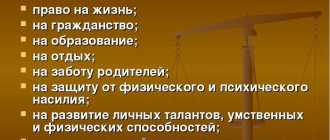Basic and special rights of the child in the Russian Federation
Every child born in the Russian Federation has his own rights. They are enshrined at the legislative level and protected by the state. The duties of the Ombudsman include monitoring the observance and protection of children's rights.
Every child has the same rights as an adult. For example, the right to life and the right to housing. But, due to the age of the copyright holder, not all of them can be implemented in full force. Therefore, those that are specific only to minors are included in a separate legislative line.
The main legislative acts in determining the interests of children are the Constitution of the Russian Federation and the Declaration on the Rights of the Child, adopted at the international level. These documents set out the following standards:
- The right to have a family. Every Russian child should have his own family. He must be brought up in it until it becomes “too small” for him, that is, his rights will not be infringed and there will be no contradiction to his interests. The legal age when this can happen is 18 years. Emancipation is provided for – “early” coming of age.
- Right to communicate. Regardless of whether the child’s parents are legally married or not, he has the right to full communication with both of them, as well as with grandparents on both sides. No parent has the right to put forward a prohibition regarding communication between a child and the other parent. Only a judicial authority can issue a legally justified ban in the presence of certain circumstances. For example, communication with the father causes psychological trauma due to immoral behavior.
- Right to protection. The object includes the health of a minor and his life. It is also possible to protect from the harmful influence of relatives, acquaintances, the environment, and the lifestyle of the parents.
- The right to have your own opinion and express it. When parents or authorized bodies decide the fate of a minor, they must take into account his opinion. After the child turns 10 years old, he can influence the decisions of these organs regarding his future life. For example, parents get divorced and cannot agree among themselves about which of them their child will live with. If the child is 10 years old, the court will ask his opinion and take it into account.
- The right to have a last name, first name and patronymic. If his parents are unknown, then guardianship authorities, medical workers, and employees of the institution can give the child’s name.
Note! This is an incomplete list of rights that every Russian minor has. He can study in Russia, receive free medical care, and be protected from various inequalities.
The Commissioner for Children's Rights in Russia is vested with broad powers to protect them
If any of the presented and secured rights are not respected, there are authorized bodies to which you can turn for protection. This:
- the prosecutor's office is a supervisory body that oversees many areas of Russian legislation;
- guardianship authorities - deal exclusively with children, their problems, their protection;
- court;
- commissioner for minors at the regional level;
- Commissioner for the protection of children's rights throughout the country.
Who is the Ombudsman for Children's Rights? This is a person who has certain powers aimed at protecting the interests and rights of all children born in the Russian Federation and having Russian citizenship.
What does the children's ombudsman do in cities and regions of Russia?
The Commissioner for the Rights of Minors in the subject has a complete understanding of the state of affairs in this area. He is endowed with the rights to personally take part in solving the problems and infringed interests of an individual minor.
The authorized person in the regions has public authority. Candidates for this position are carefully selected. The requirements apply to both the professional and personal qualities of the position applicant.
The difference between the work of the regional commissioner and the commission for minors:
- specialize in studying issues of homelessness and developing methods for its prevention;
- deal with those teenagers who are considered “problematic”;
- they include representatives of the executive branch.
The Commissioner works with minors not only occasionally, but on an ongoing basis, personally studying cases and trying to understand situations.
Russian and international laws protecting children's rights
Russia must adhere not only to the norms of its internal, Russian legislation on children, but also to comply with international norms. The main legislative acts include:
- Constitution of the Russian Federation;
- Family Code of the Russian Federation;
- Convention on the Rights of the Child;
- Law No. 124-FZ of July 24, 1998;
- Law No. 436-FZ of December 29, 2010;
- Law No. 501-FZ of December 27, 2008;
- Law No. 1-FKZ of 00.26.1997;
- Other normative acts - conventions, presidential decrees, resolutions.
Note! Not only children themselves, but also their representatives, strangers, and employees of medical, social or educational institutions can apply for protection of children’s rights.
Children's Ombudsman - activities and tasks
The Children's Ombudsman for the Protection of Children's Rights (authorized representative), as mentioned earlier, is appointed directly by the head of state, and he has powers until he is removed from office, after which his authorized representatives are appointed. Let's consider the main areas of activity, as well as the tasks of this official:
- monitoring compliance with the established norms of the Constitution of the Russian Federation, as well as generally accepted international acts and country legislation in the field of minors;
- providing certain recommendations for authorities and local self-government regarding the full elimination of possible infringement of the interests and capabilities of children;
- generalization of existing practice (individual specialists or special scientific institutions can also be involved on a contractual basis).
These are the main tasks of the ombudsman. At the same time, it should be understood that this person is not a supervisory structure acting as a guardianship authority or board of trustees. This is another authority that is endowed with the ability to gain access to almost any information. The powers include free visits to any existing organization or management institute.
It should be noted that the activities of this representative are not suspended even in cases where a state of emergency is declared in the entire country or a particular region. This representative is not a full-fledged replacement for the courts or guardianship authorities, however, he has the rights to file a corresponding application with the competent structure to conduct a certain trial or suppress an offense.
Important. In relation to each appeal of the commissioner, in which he sees a violation of the rights of a minor, a full investigation is required and, if necessary, the perpetrators are held accountable.
In addition to the main authorized person for children's rights, other representatives are appointed on the territory of the Russian Federation, whose subsequent activities comply with the laws of specific regions or constituent entities of the Russian Federation. These specialists are vested with similar powers, but they do not apply at the federal level, but only at the local level.
Who is the Ombudsman for Children's Rights?
This is a person holding a position and meeting certain requirements, who, on the basis of Russian and international law, protects and defends the rights of children. In addition, he is given additional tasks that must be completed.
Requirements for the Ombudsman for Children's Rights
In Art. 14 of Law No. 501-FZ, which directly regulates the activities of the children's ombudsman, spells out a complete list of requirements for a person applying for this position. If at least one condition is not met, the appointment will be denied.
To become a child protection ombudsman, you need to:
- monitor the implementation of norms for the protection of children's rights in the territory of the entrusted subject of the federation. After studying, the information received needs to be analyzed and conclusions drawn;
- provide widespread assistance to the effective functioning of the state system for the protection of the rights of minors, their implementation and control over their implementation;
- take measures to prevent and suppress illegal actions against children.
All actions of the ombudsman must be confirmed by the programs being developed, actual actions within the entrusted subjects, actually adopted regulations and ongoing activities.
The requirements for a person applying for this responsible position are specified in Art. 11 of Law No. 1-FKZ. Potential Authorized Person:
- cannot be a deputy of the State Duma of the Russian Federation, members of the Federation Council of the Russian Federation, be a member of the regional deputy composition, be in the civil service, or engage in any paid or unpaid activity. The exception is teaching, scientific or creative activities;
- cannot be a citizen or subject of another state, he cannot have a residence permit in another country;
- he cannot conduct active political activities, be an active member of a party or other public association of people whose goal is political interaction;
- must cease his activities included in the prohibited list at least 2 calendar weeks before taking office.
If at least one of the conditions is not met, the applicant will not be appointed to the position. The appointment takes place by Resolution of the State Duma of the Russian Federation and the Decree of the President of the Russian Federation.
People who can apply for the position of UPPR have the right to be proposed to the President for consideration by any government agencies, public associations and other institutions. In addition to the requirements presented in Art. 11 of Law No. 1-FKZ, there are additional ones. This:
- age not younger than 30 years;
- availability of higher education received in Russia in any specialty;
- impeccable reputation;
- practical experience in conducting human rights activities when working with minors.
Compliance with the totality of all requirements is mandatory for a potential RF UPPR.
Requirements for the Ombudsman for Children's Rights are defined in federal legislation
Functions of the Commissioner for Children's Rights
A person in such a position has certain functions and tasks that he must perform within the framework of his powers. The list of functions includes:
- timely control over the implementation and full compliance with all regulations adopted at the regional and federal levels and relating to minor children. All subordinate authorized persons must submit timely reports in these areas;
- if violations are detected, full assistance in restoring rights;
- overall control over how authorized local bodies eliminate violations within the framework of identified violations, if necessary, developing measures and making recommendations;
- analysis of practice, generalization of the results obtained, work to improve them with the involvement of specialists;
- psychological and other work with parents whose children find themselves in a difficult situation both psychologically and mentally;
- ensuring cooperation and interaction of various related authorities to solve problems;
- carrying out work with parents or other legal representatives of children on training and education programs regarding the protection of children's rights;
- providing protective measures for offspring against offenses that may be committed against them.
The ombudsman also has a list of tasks that he must perform:
- control over ensuring that Russian and international legislative acts are observed throughout Russia;
- making recommendations to local authorities with a view to presenting possible violations of children's rights;
- generalization of information obtained practically;
- development of measures that can minimize the risks of committing illegal acts against minors.
Who is the Ombudsman for Children's Rights?
Note! Each region is provided with a list of tasks for the long and short term. They must be completed by the deadline.
Federal Law of December 27, 2018 No. 501-FZ
RUSSIAN FEDERATION
THE FEDERAL LAW
About the Commissioners for Children's Rights in the Russian Federation
Adopted by the State Duma on December 19, 2021
Approved by the Federation Council on December 21, 2021
(As amended by Federal Law No. 116-FZ dated April 30, 2021)
Article 1. General provisions
This Federal Law defines the specifics of the legal status, main tasks and powers of the Commissioner under the President of the Russian Federation for Children’s Rights (hereinafter referred to as the Commissioner), as well as the basis of the legal status of Commissioners for Children’s Rights in the constituent entities of the Russian Federation.
Article 2. Activities of the Commissioner
1. The activities of the Commissioner are aimed at ensuring guarantees of state protection of the rights and legitimate interests of children, the implementation and observance of the rights and legitimate interests of children by state bodies, local governments and officials.
2. The authorized person promotes:
1) restoration of the violated rights and legitimate interests of children;
2) improving the legislation of the Russian Federation in terms of protecting the rights and legitimate interests of children;
3) development of international cooperation in the field of protection of the rights and legitimate interests of children;
4) improving the forms and methods of protecting the rights and legitimate interests of children.
3. The activities of the Commissioner complement the existing means of protecting the rights and legitimate interests of children, does not abolish the powers of state bodies ensuring the protection and restoration of violated rights and legitimate interests of children, and does not entail a revision of such powers.
Article 3. Appointment to the position of Commissioner. Termination of powers of the Commissioner
1. The Commissioner is appointed to the position by the President of the Russian Federation for a period of five years. The same person cannot be appointed Commissioner for more than two consecutive terms.
2. The powers of the Commissioner may be terminated early by decision of the President of the Russian Federation.
Article 4. Requirements for the Commissioner
1. A citizen of the Russian Federation who is not younger than thirty years of age, permanently residing in the Russian Federation, who does not have citizenship (nationality) of a foreign state or a residence permit or other document confirming the right to permanent residence of a citizen of the Russian Federation on the territory of a foreign state, who has an impeccable reputation, having a higher education and experience in implementing and protecting the rights and legitimate interests of children, restoring violated rights and legitimate interests of children, or experience in human rights activities. (As amended by Federal Law No. 116-FZ dated April 30, 2021)
2. The authorized person cannot be a member of the Federation Council of the Federal Assembly of the Russian Federation, a deputy of the State Duma of the Federal Assembly of the Russian Federation, a deputy of the legislative (representative) body of state power of a constituent entity of the Russian Federation, a member of a political party or other public association pursuing political goals, or engage in other paid activities , with the exception of teaching, scientific and other creative activities.
3. The Commissioner is subject to the requirements, restrictions and prohibitions established by Federal Law of December 25, 2008 No. 273-FZ “On Combating Corruption” in relation to persons holding public positions in the Russian Federation.
4. The authorized person is obliged to cease activities incompatible with his status within fourteen days from the date of appointment to the position.
Article 5. Main tasks of the Commissioner
The main tasks of the Commissioner are:
1) ensuring the protection of the rights and legitimate interests of children who are citizens of the Russian Federation on the territory of the Russian Federation and on the territories of foreign states, children who are foreign citizens or stateless persons on the territory of the Russian Federation in accordance with the legislation of the Russian Federation and international treaties of the Russian Federation ;
2) promoting the formation and effective functioning of the state system for ensuring the implementation, compliance and protection of the rights and legitimate interests of children by state bodies, local governments and officials;
3) monitoring and analysis of the effectiveness of the functioning of mechanisms for the implementation, observance and protection of the rights and legitimate interests of children by federal executive authorities, state authorities of constituent entities of the Russian Federation, local government bodies, educational and medical organizations, organizations providing social and other services to children and families, having children, and officials;
4) participation in the formation and implementation of a unified state policy in the field of ensuring and protecting the rights and legitimate interests of children, including participation in the activities of coordinating bodies created for the purpose of implementing this state policy, as well as preparation and submission to the President of the Russian Federation and the Government of the Russian Federation Federation of relevant proposals;
5) preventing violations of the rights and legitimate interests of children, promoting the restoration of violated rights and legitimate interests of children;
6) participation in activities to prevent neglect and juvenile delinquency;
7) promoting the development of international cooperation in the field of protecting the rights and legitimate interests of children.
Article 6. Powers of the Commissioner
1. In order to implement the tasks assigned to him, the authorized person:
1) sends to state bodies that have the right to appeal to the Constitutional Court of the Russian Federation, motivated proposals within its competence to appeal to the Constitutional Court of the Russian Federation with a request for compliance with the Constitution of the Russian Federation of federal laws, other normative legal acts of the Russian Federation, laws and other regulatory legal acts of the constituent entities of the Russian Federation;
2) sends motivated proposals to members of the Federation Council of the Federal Assembly of the Russian Federation, deputies of the State Duma of the Federal Assembly of the Russian Federation, to legislative (representative) bodies of state power of the constituent entities of the Russian Federation, to other subjects of the right of legislative initiative on the adoption of legislative acts, on making changes to legislative acts, aimed at ensuring the implementation and observance of the rights and legitimate interests of children;
3) sends to the heads of federal executive authorities, state authorities of constituent entities of the Russian Federation, other state bodies, local self-government bodies motivated proposals to invalidate or suspend the validity of legal acts and decisions in cases where these acts and decisions violate the rights and legitimate interests of children , or on introducing changes to these acts and decisions aimed at ensuring the implementation and observance of the rights and legitimate interests of children;
4) applies to the court with administrative claims to declare illegal decisions, actions (inaction) of state authorities, local governments, other bodies, organizations vested with certain state or other public powers, officials, state or municipal employees in defense of the rights and legitimate interests of children, if it believes that the contested decisions, actions (inactions) do not comply with the normative legal act of the Russian Federation, violate the rights and legitimate interests of children, create obstacles to the realization of their rights and legitimate interests, or any obligations are illegally assigned to them;
5) participates on his own initiative in court proceedings in civil cases to give an opinion in order to protect the rights and legitimate interests of children;
6) sends to state bodies, local government bodies and officials, in whose decisions or actions (inaction) violations of the rights and legitimate interests of children are seen, motivated proposals containing recommendations for eliminating these violations, as well as on bringing in persons guilty of violating the rights and legitimate interests of children, to disciplinary, administrative or criminal liability in the manner established by the legislation of the Russian Federation;
7) carries out, in accordance with the legislation of the Russian Federation, independently or jointly with authorized state bodies and officials, verification of information set out in applications addressed to the Commissioner, or other information on issues related to violations of the rights and legitimate interests of children or failure to accept federal executive bodies, bodies executive power of the constituent entities of the Russian Federation, local government bodies, educational and medical organizations, organizations providing social and other services to children and families with children, and officials of measures to ensure and protect the rights and legitimate interests of children, and also receives from these bodies, organizations and individuals, relevant explanations;
 exercises other powers provided for by the legislation of the Russian Federation.
exercises other powers provided for by the legislation of the Russian Federation.
2. The administrative claim provided for in paragraph 4 of part 1 of this article, in accordance with the legislation of the Russian Federation on taxes and fees, is not subject to state duty.
3. When carrying out his activities, the authorized person has the right:
1) request and receive from state bodies, local governments and officials the necessary information, documents and materials;
2) upon presentation of an official ID, freely visit federal government bodies, government bodies of constituent entities of the Russian Federation, local government bodies, educational and medical organizations, organizations providing social and other services to children and families with children;
3) without special permission, visit penal institutions and pre-trial detention centers where minors, pregnant women and women whose children are in children's homes of correctional institutions are kept;
4) engage scientific and other organizations, as well as scientists and specialists, to carry out expert and scientific-analytical work in the field of protecting the rights and legitimate interests of children, including on a contractual basis.
4. Managers or persons temporarily performing their duties, other officials of federal government bodies, government bodies of constituent entities of the Russian Federation, local governments, institutions and bodies executing punishment, educational and medical organizations, organizations providing social and other services to children and families with children are obliged to immediately receive the Commissioner.
5. Federal government bodies, government bodies of constituent entities of the Russian Federation, local government bodies, institutions and bodies executing punishments, educational and medical organizations, organizations providing social and other services to children and families with children are required to provide the Commissioner within fifteen days from the date of receipt of the Commissioner's request for the necessary information, documents and materials. The response to the Commissioner's request is sent signed by the official to whom the request was directly addressed, or the person temporarily performing his duties.
Article 7. Consideration of applications by the Commissioner
1. The Commissioner considers appeals from citizens (including minors), associations of citizens, organizations (hereinafter in this article - applicants) containing proposals, statements, complaints or information on issues related to violations of the rights and legitimate interests of children, in the manner established by the Federal Law of May 2, 2006 No. 59-FZ “On the procedure for considering appeals from citizens of the Russian Federation”, this Federal Law, as well as in the manner approved by the Commissioner.
2. Appeals addressed to the Commissioner by persons in places of forced detention are not subject to review by the administration of places of forced detention and are sent to the Commissioner within twenty-four hours.
3. The Commissioner considers the merits of an appeal containing a proposal, statement, complaint or information on issues related to the violation of the rights and legitimate interests of children, or explains to the applicant what means can be used to protect the rights and legitimate interests of children, or sends the appeal to a government agency , local government body or official whose powers include consideration of the appeal.
4. The Commissioner notifies the applicant of the results of consideration of the application.
Article 8. Annual report of the Commissioner
1. The Commissioner is accountable to the President of the Russian Federation. At the end of the calendar year, the Commissioner sends a report to the President of the Russian Federation on the results of his activities, including an assessment of the observance of the rights and legitimate interests of children in the Russian Federation, as well as proposals for improving their legal status.
2. Annual reports of the Commissioner are subject to posting on the official website of the Commissioner on the Internet information and telecommunications network and official publication in the Rossiyskaya Gazeta.
Article 9. Interaction of the Commissioner with state bodies, local government bodies and officials ensuring the protection of the rights and legitimate interests of children
1. The Commissioner, within the limits of his powers, interacts with state bodies, local government bodies, the Commissioner for Human Rights in the Russian Federation, the Commissioners for Children’s Rights in the constituent entities of the Russian Federation and other officials who ensure the protection of the rights and legitimate interests of children.
2. The Commissioner, in order to ensure the effective activities of the Commissioners for Children’s Rights in the constituent entities of the Russian Federation:
1) coordinates the activities of commissioners for children’s rights in the constituent entities of the Russian Federation, aimed at implementing a unified state policy in the field of ensuring and protecting the rights and legitimate interests of children;
2) provides organizational, legal, informational and other assistance to the commissioners for children’s rights in the constituent entities of the Russian Federation within the limits of their powers;
3) has the right to create a coordinating council of commissioners for children’s rights as a consultative and advisory body.
Article 10. Public representatives. Expert, advisory and other advisory bodies
1. The Commissioner has the right to appoint public representatives.
2. The Commissioner has the right to create expert, advisory and public councils, working groups and other advisory bodies operating on a voluntary basis, and to invite officials of federal government bodies, government bodies of constituent entities of the Russian Federation, local government bodies, to participate in their work. representatives of public organizations.
Article 11. Place of permanent location and financial support for the activities of the Commissioner
1. The permanent location of the Commissioner is the city of Moscow.
2. Financial support for the activities of the Commissioner is carried out at the expense of budgetary allocations from the federal budget.
Article 12. Responsibility for interference in the activities of the Commissioner
Interference in the activities of the Commissioner in order to influence his decisions, failure by officials to comply with the legal requirements of the Commissioner and obstruction of his activities in any other form entail liability established by the legislation of the Russian Federation.
Article 13. Commissioner for Children's Rights in a constituent entity of the Russian Federation
1. The law of a constituent entity of the Russian Federation may establish the position of ombudsman for children’s rights in a constituent entity of the Russian Federation in order to provide additional guarantees for the effective functioning of mechanisms for the implementation, observance and protection of the rights and legitimate interests of children by state authorities of the constituent entity of the Russian Federation, local government bodies, educational and medical organizations , organizations providing social and other services to children and families with children, and officials.
2. The position of the Commissioner for Children's Rights in a constituent entity of the Russian Federation is a government position of a constituent entity of the Russian Federation.
21. A citizen of the Russian Federation who permanently resides in the Russian Federation and does not have citizenship (nationality) of a foreign state or a residence permit or other document confirming the right to permanent residence of a citizen of the Russian Federation in the territory of a foreign country may be appointed as the Commissioner for Children's Rights in a subject of the Russian Federation. state, with an impeccable reputation, higher education and experience in implementing and protecting the rights and legitimate interests of children, restoring violated rights and legitimate interests of children, or experience in human rights activities. (Part introduced - Federal Law No. 116-FZ dated April 30, 2021)
3. The Commissioner for Children's Rights in a constituent entity of the Russian Federation carries out its activities within the boundaries of the territory of the constituent entity of the Russian Federation.
4. The legal status, main tasks and powers of the Commissioner for Children’s Rights in a constituent entity of the Russian Federation are established by the law of the constituent entity of the Russian Federation, taking into account the provisions of this Federal Law.
5. The Commissioner for Children's Rights in a constituent entity of the Russian Federation is appointed to the position in the manner established by the law of the constituent entity of the Russian Federation, in agreement with the Commissioner.
6. Early termination of the powers of the Commissioner for Children’s Rights in a constituent entity of the Russian Federation is carried out in the manner established by the law of the constituent entity of the Russian Federation, in agreement with the Commissioner.
7. Financial support for the activities of the Commissioner for Children’s Rights in a constituent entity of the Russian Federation is carried out at the expense of budgetary allocations from the budget of the constituent entity of the Russian Federation.
Article 14. Powers of the Commissioner for Children's Rights in a constituent entity of the Russian Federation
1. Commissioner for Children's Rights in a constituent entity of the Russian Federation:
1) monitors and analyzes the implementation, observance and protection of the rights and legitimate interests of children on the territory of a constituent entity of the Russian Federation;
2) promotes the effective functioning of the state system for ensuring the implementation, compliance and protection of the rights and legitimate interests of children in the constituent entity of the Russian Federation;
3) takes, within the limits of its powers, measures to prevent and suppress violations of the rights and legitimate interests of children.
2. At the end of the calendar year, the Commissioner for Children’s Rights in a subject of the Russian Federation sends to the highest official of the subject of the Russian Federation (the head of the highest executive body of state power of the subject of the Russian Federation), to the legislative (representative) body of state power of the subject of the Russian Federation and the Commissioner a report on the results of its activities, including an assessment with
Grounds for early release of the Ombudsman for Children's Rights
There are certain circumstances, upon discovery of which, the commissioner for the protection of minors may be removed from his position. These circumstances are prescribed in regional and federal legislation. In Art. 13 of Law 1-FKZ provides an exhaustive list:
- violation of the requirements given in Art. 11 of Law No. 1-FKZ;
- the conviction in a criminal case that was made against this person has entered into force;
- manifestation of the commissioner’s own initiative to resign his powers in this area.
If a person in such a responsible position cannot perform his duties for 4 months or more due to health reasons or other reasons, his powers may be terminated by a decision of the State Duma, which is adopted after a meeting on this topic.
The basis for termination of powers and early dismissal of the Commissioner is the Resolution of the State Duma of the Russian Federation.
This law provides the Commissioner for Children's Rights with a fairly wide list of rights and powers, so here we will highlight those whose implementation has the most effective mechanisms of influence on violators of children's rights, namely: - send to state authorities of the Sverdlovsk region, local government bodies, organizations, regardless of their organizational and legal form, operating in the territory of the Sverdlovsk region, in the actions, inaction or decisions of which the Commissioner sees violations, his conclusion containing proposals for measures to restore the violated rights of the child; - apply to the Statutory Court with a request for compliance with the Charter of the Sverdlovsk Region of laws and regulatory legal acts of the Sverdlovsk Region affecting the rights of the child, as well as municipal regulatory legal acts; - independently conduct an inspection of the activities of state authorities of the Sverdlovsk region, local government bodies in implementing the rights and legitimate interests of the child, or have the right to apply for an inspection of these activities to the state authorities of the Sverdlovsk region and local government bodies in accordance with their competence; - submit a proposal to the federal government body, the government body of the Sverdlovsk region, another government body of the Sverdlovsk region, whose officials are authorized in accordance with federal legislation or the legislation of the Sverdlovsk region to draw up protocols on administrative offenses, to consider the issue of bringing officials , in the actions, inaction or decisions of which the Commissioner sees violations of the rights and legitimate interests of the child; — invite the employer to consider the issue of bringing to disciplinary liability officials whose actions, inactions or decisions the Commissioner sees as violations of the rights and legitimate interests of the child; special reports to the Legislative Assembly, the Governor of the Sverdlovsk region and the Statutory Court . The implementation of these rights can be found in the annual reports on the activities of the Commissioner in the reporting year.
Since the Commissioner for Children's Rights is given the right to independently conduct inspections of organizations, he approved the Regulations for conducting inspections by Order No. 08-PUR dated November 14, 2012 .
Peculiarities of the activities of the Commissioner for Children's Rights
When an official appointment to a position occurs, the Commissioner receives an appropriate certificate that helps him exercise his powers to the fullest extent. Upon presentation of the document, it must be freely allowed into all institutions, buildings, organizations, and public associations that exist in Russia. He can obtain any information, justifying the demand by the fact that it is necessary to protect children's rights.
The certificate is valid for the entire term of office unless terminated early. The term of office of the Commissioner is prescribed in the Presidential Decree.
The activities of the UPPR are regulated and ensured by the Public Chamber. But he has the right to independently determine the following categories of assistants for comfortable and fruitful work. This:
- representatives in the regions on a permanent or temporary basis;
- experts, consultants in various fields;
- composition of working groups.
Note! All bodies and groups that are created by the RF UPPR for more rational activities conduct work on a voluntary basis. Both government employees and private experts can be involved.
Grounds for appeals and complaints to the Commissioner for Children's Rights in the Russian Federation
You can contact the Ombudsman in the following cases:
- authorized regional bodies are inactive or take unlawful actions. For example, failure to provide housing for orphans;
- it is necessary to challenge the act of the justice authority in relation to a minor, issued in accordance with Russian legal proceedings;
- the need to carry out further procedural actions.
A parent or other legal representative can apply.
Rules for writing and filing an application to the Commissioner for Children's Rights
Any written appeal from a citizen of the Russian Federation, including to the UPPR of the Russian Federation, is drawn up in accordance with Art. 7 of Law No. 59-FZ. That is, it:
- must be free of blots, errors and corrections;
- contain up-to-date and reliable information;
- don't be anonymous. It is necessary to provide information about the applicant or his representative;
- signed.
Note! Anonymous complaints from citizens are not accepted for consideration.
Procedure and methods of contacting the Children's Ombudsman
There are several ways to contact the Children's Ombudsman:
- personal by appointment at established reception hours;
- electronic;
- using Russian Post.
The most popular method of circulation is electronic. There are several options:
- through the official website of the RF UPPR. You need to enter all the necessary information into the form, then the system will accept the request;
- via official email address;
- through an official account on popular social networks.
Note! The situation that led to the filing of the complaint should be discussed in detail in the appeal. The use of profanity, rude words, and insults towards third parties is not permitted.
How to contact the Children's Ombudsman in Russia: 6 ways
There are several ways to contact the Commissioner for Children’s Rights in the Russian Federation:
- Registered letter by mail. A convenient method, since you will receive a notification confirming that the letter has reached the Institute of the Commissioner.
- Fill out the form on the official website of the commissioner. A form will open in front of you, in which you need to enter important data: email address, full name, residential address, citizenship, contact information, subject of the appeal and the appeal itself.
- Send a complaint by fax. For this, the fax number of the receptionist Anna Kuznetsova (the current commissioner for children's rights under the president) is used.
- Arriving at an appointment with the regional ombudsman. To do this, you need to make an appointment in advance; the queue is often long.
- Send an email
- You can write a message on social networks, on the personal page of the Commissioner for Children’s Rights. This information is readable, but it is better to give preference to an official application to the Institute of the Ombudsman.
Lawyers recommend filing a complaint in writing with a return notice. In this case, they will also be required to respond to your letter in writing and notify you of the measures taken.
Options for resolving complaints
The Ombudsman has the right to accept or refuse a complaint for consideration. If he refuses to consider an appeal from citizens, then his responsibilities include a written justification for the refusal and its substantiation by regulations.
Regarding the acceptance of complaints for consideration, the UPPR has the following options:
- consideration of the complaint as a higher authority. For example, the applicant had previously applied to the authorized bodies, his application was considered, but the result did not satisfy him. There is a statute of limitations – one year from the moment the child’s rights were violated or the authorized bodies learned about it;
- redirect the complaint to those institutions that specialize in solving the problems that are the subject of the application;
- the authorized person personally examines the appeal, decides to redirect it for consideration to the competent authorities, and controls the outcome of the case.
If the Ombudsman does not accept the complaint for consideration, he notifies the complainant about this within 10 days from the date of registration of the incoming document. If accepted, then the body whose work will be checked is notified about this.
Reasons for returning a complaint
The applicant may be refused acceptance and consideration of a written application for the following reasons:
- the document was sent to the wrong authority;
- contains false, irrelevant, false information;
- does not contain sufficient grounds for acceptance;
- improperly formatted;
- contains insults to third parties, profanity;
- not signed.
Even if the complaint is not returned back to the applicant, there must be a written justification for the refusal to consider.
Sample application to the Commissioner for Children's Rights in the Russian Federation
The complaint is filed in accordance with accepted standards of business correspondence. Therefore it should contain:
- data of the UPPR to which it is sent;
- information about the applicant – full name, passport data, contact details. Only relevant information should be provided as it may be necessary to work closely with the applicant. Therefore, the phone number must be working and the address must be actual. If your place of residence and place of registration do not match, you must provide 2 addresses;
- "body". The circumstances that led to the application to the Children's Ombudsman are described in detail here;
- date of writing and signature of the applicant.
In the “body” of the appeal you need to write down in detail:
- the rights of the offspring that were violated;
- by whom they were violated;
- whether any action was taken or just inaction;
- from which authorized bodies;
- what measures were taken by the applicant to protect the rights of his child;
- correctly formulated results that the applicant wishes to achieve through this appeal.
complaints can be made here:
Commissioner under the President of the Russian Federation for Children's Rights
A federal employee conducts his work in Moscow. He is appointed to the post and removed from it by order of the President of the Russian Federation. Responsibility for maintaining the life of the commissioner is assigned to the Public Chamber. By 2011, a “vertical” of power with a federal representative at its head had been built within the structure of the commissioner institution.
Powers of the Federal Commissioner
Presidential Decree No. 1518 “On the Commissioner under the President of the Russian Federation for Children’s Rights” gives the following opportunities to the federal representative:
- make a request to provide the necessary information to federal executive, regional and municipal authorities , organizations and officials of the Russian Federation;
- freely visit authorities, organizations, child care institutions;
- independently or together with other government agencies and officials, check the legality of actions (inactions) of federal executive, regional and municipal authorities , as well as officials, and receive explanations of interest from them;
- notify competent persons of their discretion in their decisions or actions (inactions), acts of infringement of the interests of the child and address them with proposals for correcting these types of offenses and restoring a fair order;
- in accordance with a certain procedure, attract scientific and other organizations, scientists and specialists to conduct examinations in the field of violation of child freedoms.







